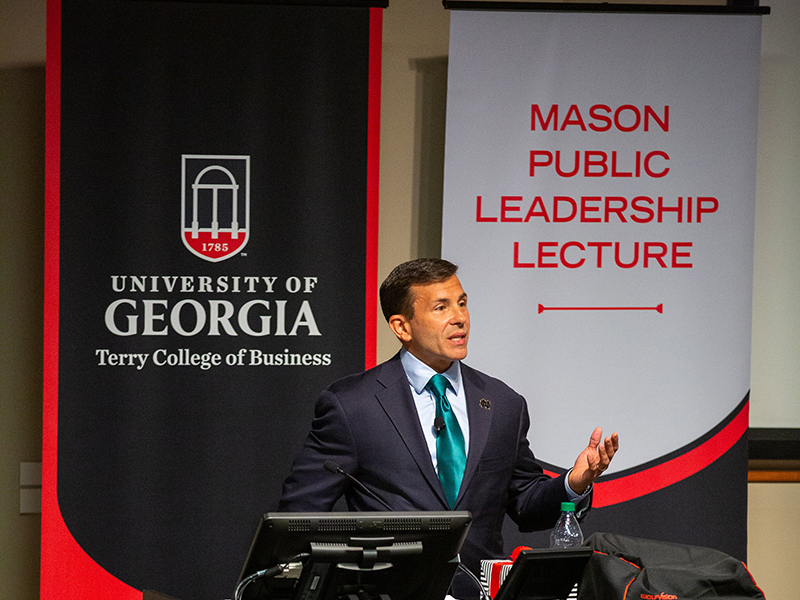Biotechnology companies have a moral obligation to make life-saving medicines affordable and available, according to John Crowley, CEO of Amicus Therapeutics and inspiration for the movie “Extraordinary Measures.”
Crowley, who started a bioscience venture in order to save the lives of his children who were diagnosed with a rare genetic disorder, delivered the Mason Public Leadership Lecture at the University of Georgia on Sept. 20.
Using examples of three child patients, Crowley explained how the public and private sectors work together to create revolutionary treatments.
“It almost always starts with a patient in need, oftentimes a child. When you think about making medicines, it starts with a parent coming to a researcher at a university and they start with the same four words: ‘We have a problem.’ And a university researcher answers with another four words: ‘I have an idea,’” Crowley said.
Crowley spoke from experience. After learning that his children had just months to live, he walked away from his job as marketing director at Bristol-Myers Squibb and sought to change the course of his children’s prognoses. He fought against time, as well as the business, medical and scientific establishments that were wary of his hard-charging determination.
“At Amicus, I ask each of our employees only one thing. For every decision you make, think about it as if you had that disease or were the parent of a child living with that disease,” he said. “The greatest skill I believe a leader can possess and develop is empathy, to feel the hope of another.”
Crowley said Amicus is guided by the principle of helping people first, while remaining financially viable.
“I tell anyone who’s thinking about investing in our company that our No. 1 mission is to deliver the highest-quality medicines to people living with diseases,” he said. “Capital and being able to build a vibrant business is the lifeblood of our success, but patients are our primary stakeholders. These are not competing forces. I believe they’re quite complementary. If we make great medicines and get them to as many people as quickly as possible, we will not only advance shareholder interest, we will maximize shareholder return.”
The Amicus business model focuses on developing treatments for the kind of rare diseases often overlooked by other biotechnology companies.
“Just by going deep and touching one life you can change the lives of many,” Crowley said. “When it’s in your power to change one life, maybe that’s the only life you ever touch with that act, but many times those ripple effects reach out and touch so many.”
Before Amicus Therapeutics was established, Crowley co-founded Novazyme Pharmaceuticals, a company that exclusively focused on developing a treatment for Pompe disease, the genetic disorder that afflicted his children. Within two years, his kids started an experimental enzyme therapy that saved their lives.
“[When we treated my children], it was a great day. The treatment saved Megan and her brother Patrick’s lives, and it stopped the enlargement of their hearts, the most fatal aspect of Pompe disease. It made Megan in particular much stronger for a time. But we realized within a year that it wasn’t a cure; it was a treatment. We were back at the beginning, looking for the next thing,” he said.
“But it gave us time. Time together as a family, time to live life. It also gave time for me as an entrepreneur and for our scientists to go back to the drawing board,” he said. “We’re now working in the world of gene therapies.”
The Mason Public Leadership Lecture is supported by a gift from Keith Mason, an alumnus of UGA’s Terry College of Business and School of Law who serves as principal for KWM Capital Management in Atlanta. The lecture features prominent business leaders who have contributed significantly to their communities or spent time in a public service role.
The lecture is part of the Terry Leadership Speaker Series presented by the college’s Institute for Leadership Advancement. The institute was established in 2001 to develop values-based, impact-driven leaders who serve their communities and organizations. Crowley’s lecture also is part of the university Signature Lecture Series, which features speakers noted for their broad, multidisciplinary appeal and compelling bodies of work.

